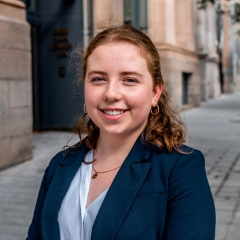Finance (BComm)
Why study Finance?
Finance is a competitive program in which you acquire the skills to manage money and practise making decisions that affect the future of corporations, communities and investors. As a Finance student, you will learn to:
- Understand the way money appreciates over time
- Analyze investment opportunities
- Develop financing alternatives
- Weigh risk factors to build wealth responsibly
Choosing one of five areas of finance — corporate finance, investments, financial institutions, derivatives, and international finance — you learn through lectures, case studies, simulation exercises and experiential learning. Our Co-op program places you in a financial sector that you want to practise in. Our two prestigious investment/portfolio management programs: Van Berkom Investment Management Program (VBIMP), and Kenneth Woods Portfolio Management Program (KWPMP) provide top students the chance to manage portfolios of more than $2 million. You can even develop an academic research project as part of our Honours in Finance program.
Whether you become a commercial banker for a multinational corporation or a consultant with a charitable focus, you’ll leave us motivated to build a sound financial future for any number of clients.
Program highlights
- Participate in the program’s highly engaged student societies, the Finance and Investment Students’ Association (FISA) or the John Molson Investment Society (JMIS)
- Take part in national and international case competitions through the John Molson Competition Program
Special funding for out-of-province students
Up to $4000 for undergraduate programs.
Program structure
Program options
A Bachelor of Commerce degree takes a minimum of three or four years (90 – 120 credits) of full-time study, depending on your academic background. All John Molson School of Business students follow a core business curriculum coupled with a John Molson School of Business major, which may be combined with a minor in another discipline or any combination of elective courses that interest them.
- Core business courses (48 credits)
- Finance major courses (24 credits)
- Electives (18 credits) which may include a business minor (12 credits)
Students who qualify for the Honours in Finance program complete a 24-credit Finance major plus a six-credit research-based course.
A Minor in Finance (12 credits) is only available to John Molson School of Business students already in the program. A minor will fulfil the 12 elective credits in your BComm and complement your major field of study.
Integrated path
Get a head start on graduate studies. As an undergraduate student in Finance, you can take up to nine credits that count towards both your Bachelor of Commerce and a Master of Science (MSc) in Finance.
Courses
Co-op program
The Co-op program gives you hands-on experience in financial management, financial analysis, and portfolio investments. During paid work terms that last 12 to 16 weeks, you’ll acquire first-hand experience in corporate finance, investments, financial institutions, derivatives, and international finance. Work terms make it possible for you to:
- Perform market comparisons
- Assess foreign exchange risk
- Conduct company valuations
- Provide advice to clients regarding their financial services objectives
- Trade in currencies on the global market
United States students: A U.S. Federal Student Aid-eligible version of this program is offered. This version meets all U.S. regulations (such as no co-operative education or e-courses) for eligible programs.
Admission criteria
Minimum cut-off averages and course requirements
- Quebec CEGEP: 26 overall, 26 math
- Pre-university:
- Average of 26 from Calculus 1 and Linear Algebra
- Applicants are eligible for admission once they have completed at least one of these two math courses. The other must be completed during the first year at Concordia.
- Strongly recommended that applicants complete both courses at CEGEP
- Professional/technical:
- Those completing a technical DEC in a business-related field may be eligible for admission.
- Students who have completed Calculus I and/or Linear Algebra must achieve an average of 26 in mathematics.
- Student without Calculus 1 or Linear Algebra, must have achieved a minimum of 75% in Secondary 5 Math (SN, TS or MATH 536). Your high school Quebec Achievement Record must be included with your application. If admitted, you will be required to complete all missing prerequisite courses as elective credits at John Molson.
- Additional information for CEGEP applicants
- Pre-university:
- High School: B overall, B in math
- One math from Pre-Calculus, Calculus, Algebra II, College Algebra or equivalent
- Canadian curricula course requirements
- Accepted international qualifications
- ACT or SAT is not required
- AP exams are not required but may qualify you for advanced standing
- International Baccalaureate (IB) diploma: 29 overall, 4 HL or 5 SL math
- one math (Applications and Interpretations HL, Analysis and Approaches HL or Analysis and Approaches SL)
- International Baccalaureate Career-related Programme (CP): 4.8/7 overall, 4 HL or 5 SL math
- one math (Applications and Interpretations HL, Analysis and Approaches HL or Analysis and Approaches SL)
- Additional Career-related Programme (CP) course requirements
- Baccalauréat français: 13 overall, 13 in math
- Required courses:
- Première : Spécialité mathématiques
- Terminale : Mathématiques complémentaires (Spécialité mathématiques recommended)
- Additional information for Baccalauréat français applicants
- Required courses:
- British system of education (GCE):
- A-levels: At least two A-level exams CC, C in math or
- AS-levels: At least 4 AS-level exams with equivalent results or
- BTEC: Level 3 Diploma or Extended Diploma in a related subject area with equivalent results
- Students without A-level math may be admissible based on AS-level or iGCSE/GCSE/O-Level exam results. Students should include all their exam results from iGCSE (or equivalent) onwards to support their application.
- Additional information for British System of Education (GCE) applicants
- University transfers (internal): 2.7 overall, 2.7 in math
- ECON 201, ECON 203 (or have exemptions)
- MATH 208 and MATH 209 (or have exemptions)
- Additional information on Internal Degree Transfer
- University transfer (external): B- overall, B- in math
- Courses in the disciplines of Calculus and Linear Algebra
Minimum cut-off averages should be used as indicators. The cut-off data may change depending on the applicant pool. Applicants who meet the stated minimum requirements are not guaranteed admission to these programs.
Application deadlines
It’s not too late to apply
Most undergraduate programs are still accepting applications for fall 2026.

FALL ENTRY (September)
Deadline: March 1
U.S. and international applicants: Apply no later than February 1 to allow time for immigration document processing. However, applying earlier is strongly recommended. Immigration processing times vary by country and delays could prevent you from starting your studies on time.

WINTER ENTRY (January)
Deadline: November 1
U.S. and international applicants: Apply no later than August 1 to allow time for immigration document processing. However, applying earlier is strongly recommended. Immigration processing times vary by country and delays could prevent you from starting your studies on time.
We reserve the right to close admission to a program at any time after the official deadline without prior notice.
Student story

Amara Ngadi
Major in Finance
Minor in Data Intelligence
I’m learning to be independent, highly organized and entrepreneurial.

Emmanuel Gaisie
Major in Finance, Minor in Business Technology Management
Emmanuel Gaisie enriched his time at Concordia by fully immersing himself in student life outside of the classroom, both in Montreal and on exchange in Madrid.

Katie Burnie
Major in Finance
Minor in International Business
Co-op is an amazing way to get your foot in the door and apply the concepts you learn in class to the real world.
Other programs of interest

Outstanding accountants keep businesses ahead of the curve: solving problems, building sound financial strategies and ensuring good fiscal health. If you’re a high achiever with an appetite for continuous learning, consider us.
Department
Faculty

At the John Molson School of Business, our economics major is applied. Because we look at the world though a business lens, you don’t just analyze data to discover how society, politics and the environment interacts with business, you also develop business strategies and organizational tactics to tackle economic problems big and small.
Faculty

The future leaders who come to our school inspire people, embrace diversity, build new business models and create wealth in socially and ecologically sustainable ways. As a JMSB student, you achieve these goals by taking an integrated approach to management studies.
Department
Faculty

